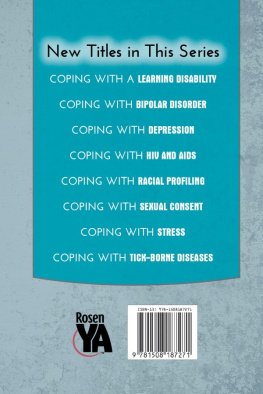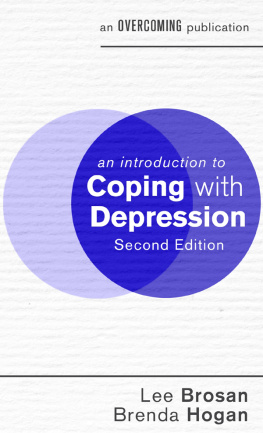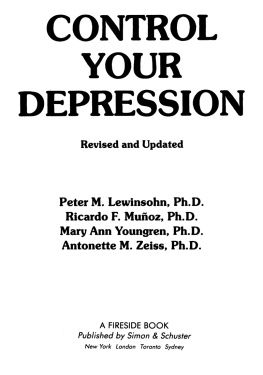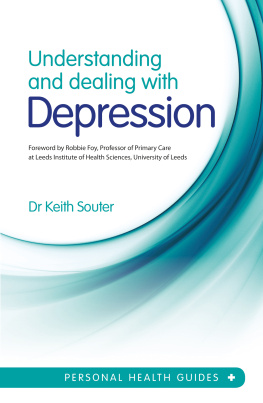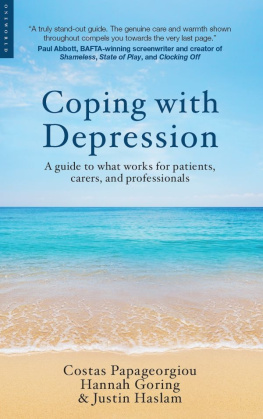
1995, 2004 by Siang-Yang Tan and John Ortberg
Published by Baker Books
a division of Baker Publishing Group
P.O. Box 6287, Grand Rapids, MI 49516-6287
www.bakerbooks.com
Coping with Depression is a revised edition of Understanding Depression
Ebook edition created 2011
All rights reserved. No part of this publication may be reproduced, stored in a retrieval system, or transmitted in any form or by any meansfor example, electronic, photocopy, recordingwithout the prior written permission of the publisher. The only exception is brief quotations in printed reviews.
ISBN 978-1-4412-3348-6
Library of Congress Cataloging-in-Publication Data is on file at the Library of Congress, Washington, D.C.
The internet addresses, email addresses, and phone numbers in this book are accurate at the time of publication. They are provided as a resource. Baker Publishing Group does not endorse them or vouch for their content or permanence.
Tan and Ortberg have written an exceptionally comprehensive yet readable book on managing depression. The combination of clinical wisdom and biblical insight will be helpful to people struggling with depression or to those working with them. For years this text was a student favorite in my pastoral counseling classesand the second edition is even better!
C. Jeffrey Terrell, Ph.D., president, Psychological Studies Institute
If depression is the common cold of the emotional life, then this volume reveals the cure. With this concise guide, Tan and Ortberg unravel the complex theories, research, and treatments for depression. Writing with a striking blend of compassion and authority, the authors guide us into the dark chamber of clinical depression and then show us to the exits.
The authors clearly describe how depression can be effectively managed and overcome with a rich mix of emotional, cognitive, behavioral, and spiritual tools. Combining state-of-the-art psychological interventions with biblical wisdom, this book is certain to become a source of insight and change for the many souls among us needlessly bearing the burden of depression.
W. Brad Johnson, Ph.D., associate professor of psychology,
United States Naval Academy
To Angela,
and to my mother, Madam Chiow Yang Quek
and the memory of my late father, Siew Thiam Tan.
Siang-Yang Tan
To Nancy
and to my father and mother,
John and Kathy Hall Ortberg.
John Ortberg
Contents
Acknowledgments
W e would like to acknowledge, with deep gratitude, the help of Kim Roth, secretary to Siang-Yang Tan at the Graduate School of Psychology, Fuller Theological Seminary, as well as the support and interest provided by Dr. David Benner, and by Paul Engle and Maria den Boer of Baker Book House, in the first edition of this book. Special thanks to Simon Reeve-Parker, assistant to Siang-Yang Tan at Fuller Theological Seminary, for his excellent work and help, and to Donald Stephenson and Mary Wenger of Baker Book House for their interest and support in the second edition of this book.
We would also like to express appreciation and love for our dear children Carolyn and Andrew Tan, and Laura, Mallory, and Johnny Ortberg, whose patience and love (and interruptions) made the writing worthwhile and kept us from getting depressed!
Most of all, we want to thank God for his help and blessing as we wrote this book together, and for the depth of Christian fellowship and spiritual direction that we experienced in Christ as we worked and prayed together. We trust and pray that this book will be a real help and blessing to its readers.

A Snapshot of Depression
The Common Cold of Emotional Life
H e had everything going for him.
He was a preacher of national renown. He interacted regularly with people at the highest echelons of power. The impact of his ministry was widely recognized by his peers and even by leaders of other religious traditions. His work had faced severe challenges, at times from powerful opponents, and yet somehow he had always continued. His personal integrity was unchallenged. His spiritual life was impeccable, at least to all appearances. He had seen answers to prayer that were nothing short of miraculous. His moral character was untainted by scandal. He not only had distant admirers but was also capable of close personal relationships and intimate partnering with colleagues in ministry. His assertiveness skills and willingness to confront head-on were legendary. He had just experienced a time of great success in his ministry, one of the peak moments of his career.
And he was depressed.
He withdrew, not only from his ministry, but from all his relationships. His loss of energy and motivation went far beyond the bounds of normal burnout; he was no longer able even to connect emotionally with other people. His perceptions became distorted; he really believed that who he was and what he had done lacked any redeeming value at all. He felt isolated and abandoned, and was certain that nobody supported him in his lifes work. He was in a state of fatigue: both his appetite and sleep patterns were disrupted. His emotional mood was extremely low: he berated himself and believed he was no longer able to make a significant contribution to life. He was consumed by fear and a sense of hopelessness. In fact, his will to live had largely eroded, and he wanted to die.
His name was Elijah.
The pages of the Bible are writ large with expressions of depression and despair: Elijah asked for his life to be taken. Jonah was deeply despondent after God didnt destroy Nineveh as he had prophesied; he sat alone outside the city comforted only by a vine that grew up to shade him from the sun. When the vine withered, Jonahs conclusion was, It would be better for me to die than to live. Jeremiah lamented the day he had been born. Jobs wife advised him to curse God and die, which could not have been encouraging.
One of the great mysteries of depression is that it seems to be no respecter of persons. People who appear to have everything to live forcareer advancement, personal attractiveness, and financial securityare as likely candidates as those on the lowest rungs of the ladder of success. Kings and queens and CEOs join hands with serfs and parking lot attendants in the brotherhood or sisterhood of melancholy. Depression is an equal opportunity employer. No one really has to ask what depression is, because weve all tasted it to one degree or another. Anthony Storr writes, Depression is part of the experience of every human being (Storr 1988, 143).
Winston Churchill battled depression. Violet Asquith recorded her first encounter with Churchill, which captures something of both his depression and his strength in combating it. For an hour at dinner he didnt speak, even though she was sitting next to him. His first words were to ask her age, and when she answered he replied with some despair, Im thirty-two already. Then defiantly, Older than anyone else who counts, though. Then savagely, Curse ruthless time. Curse our mortality. How cruelly short is our allotted span for all we must cram into it. We are worms, all worms. But I do believe I am a glowworm (Manchester 1983, 367).
Abraham Lincoln suffered bouts of what was then called melancholy severe enough to make him consider suicide. During one of his worst bouts he wrote to a friend, I am now the most miserable man living. If what I feel were equally distributed to the whole human family, there would not be one cheerful face on the earth. Whether I shall ever be better I cannot tell; I awfully forebode I shall not. To remain as I am is impossible; I must die or be better, it appears to me (Thomas 1952, 72).
Next page


